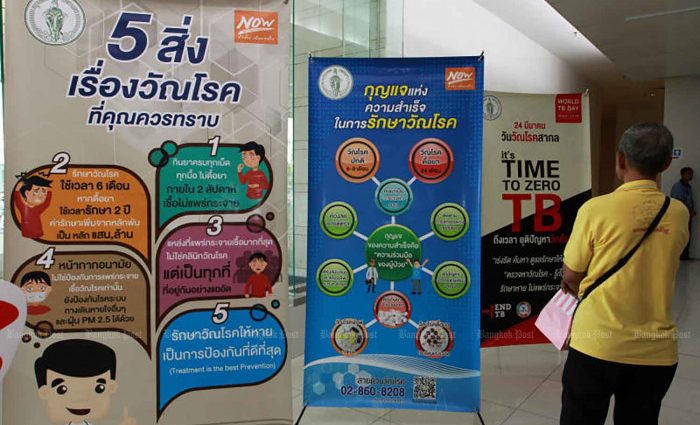
PUBLISHED : 11 Sep 2023 at 17:19
The Department of Disease Control is urging the public to get screened for tuberculosis — especially individuals with underlying medical conditions which could aggravate the disease — in an effort to prevent the spread of the disease among the population.
The call followed media reports on actor Chawin “Jug” Chitsomboon, who recently contracted tuberculosis, presumably through close contact with a friend who died from the disease on Sept 5.
DDC director-general, Dr Tares Krassanairawiwong, said the public needs to keep their guard up, as according to the World Health Organization, Thailand is among the top 30 countries with the most active tuberculosis cases in the world.
Each year, the nation logs an average of 103,000 new tuberculosis cases, and about 12,000 people die from TB-related ailments every year, according to WHO figures cited by Dr Tares.
While about a quarter of Thailand’s population have built up some resistance to tuberculosis, those with weakened immune systems are still very likely to develop severe symptoms.
As such, Dr Tares said, people who suffer from chronic health issues, such as diabetes, HIV/Aids, as well as people with high-risk factors, such as inmates and/or others living in cramped quarters, drug addicts and alcoholics, migrant workers and frontline medical staff should consider getting regular screening for tuberculosis.
Dr Niti Haetanurak, DDC deputy director-general, said that the department has reached out to Chawin’s manager to offer his friends, relatives and others who came into close contact with the actor to offer treatment.
Tuberculosis is a respiratory disease that can be transmitted through air, coughing, sneezing and talking. Common symptoms include persistent cough that lasts over two weeks, mild fever, loss of appetite and weight loss.
“It is a treatable disease, but patients are recommended to continuously take medications for six months, said Dr Phalin Kamolwat, director of the department’s tuberculosis division.
Dr Phalin said that it is important to detect the disease during its early stages.
Most importantly, people who have family members with tuberculosis are advised to seek immediate medical attention to avoid transmission.
More information can be found through DDC’s 1442 hotline, and the department’s tuberculosis division at 02 211 2224.

